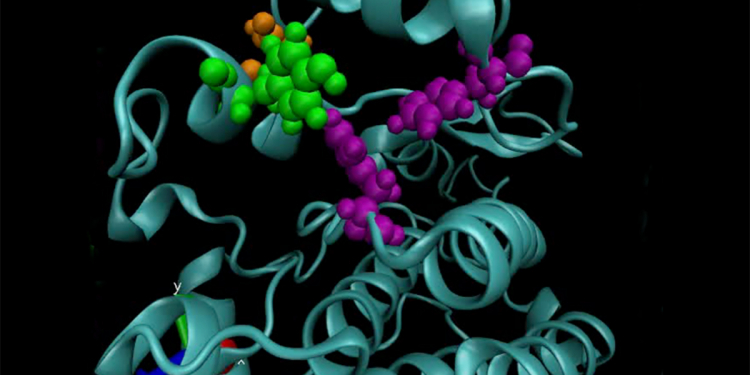The FINANCIAL — Researchers from Penn Engineering, Children’s Hospital of Philadelphia, and Yale University use molecular simulations to uncover how mutations in a class of enzymes known as kinases lead to cancer progression according to University of Pennsylvania.
Kinases, a class of enzymes that play an important role in cell signaling, growth, and metabolism, are frequently found to have mutations in cancers, with newer cancer treatments focused on targeting these mutant kinases with specific inhibitors. But because this class of enzymes are common and ubiquitous, it’s crucial to understand the precise genetic mutations that are cancerous in order to accurately predict the disease’s progression and to find personalized treatments.
A new study, published in the Proceedings of the National Academy of Sciences, shows how molecular simulations of a mutant kinase implicated in pediatric neuroblastoma, a childhood cancer impacting the central nervous system, shed light on how specific mutations lead to cancer progression. The study was co-led by Ravi Radhakrishnan, professor and chair of Penn Engineering’s Department of Bioengineering and professor in its Department of Chemical and Biomolecular Engineering. First authors include Penn’s Keshav Patil, a Chemical and Biomolecular Engineering graduate student, as well as former members of the Graduate Group in Biochemistry and Molecular Biology Earl Joseph Jordan and Jin H. Park. Penn undergraduate Krishna Suresh and Yaël P. Mossé of CHOP and Penn Medicine, also contributed to this study, according to University of Pennsylvania.
Using their new computational model, the researchers were able to study the relationship between single-point changes in the kinase gene and the subsequent changes to its protein structure and found useful commonalities in mutations that result in tumor formation and growth. Their results suggest that similar types of computational approaches could outperform existing profiling methods for other cancers and could lead to more personalized treatments in the future.
“Some cancers rely on the aberrant activation of a single gene product for tumor initiation and progression,” says Radhakrishnan. “This unique mutational signature may hold the key to understanding which patients suffer from aggressive forms of the disease or for whom a given therapeutic drug may yield short- or long-term benefits. Yet, outside of a few commonly occurring ‘hotspot’ mutations, experimental studies of clinically observed mutations are not commonly pursued.”
The FINANCIAL — Researchers from Penn Engineering, Children’s Hospital of Philadelphia, and Yale University use molecular simulations to uncover how mutations in a class of enzymes known as kinases lead to cancer progression according to University of Pennsylvania.
Kinases, a class of enzymes that play an important role in cell signaling, growth, and metabolism, are frequently found to have mutations in cancers, with newer cancer treatments focused on targeting these mutant kinases with specific inhibitors. But because this class of enzymes are common and ubiquitous, it’s crucial to understand the precise genetic mutations that are cancerous in order to accurately predict the disease’s progression and to find personalized treatments.
A new study, published in the Proceedings of the National Academy of Sciences, shows how molecular simulations of a mutant kinase implicated in pediatric neuroblastoma, a childhood cancer impacting the central nervous system, shed light on how specific mutations lead to cancer progression. The study was co-led by Ravi Radhakrishnan, professor and chair of Penn Engineering’s Department of Bioengineering and professor in its Department of Chemical and Biomolecular Engineering. First authors include Penn’s Keshav Patil, a Chemical and Biomolecular Engineering graduate student, as well as former members of the Graduate Group in Biochemistry and Molecular Biology Earl Joseph Jordan and Jin H. Park. Penn undergraduate Krishna Suresh and Yaël P. Mossé of CHOP and Penn Medicine, also contributed to this study, according to University of Pennsylvania.
Using their new computational model, the researchers were able to study the relationship between single-point changes in the kinase gene and the subsequent changes to its protein structure and found useful commonalities in mutations that result in tumor formation and growth. Their results suggest that similar types of computational approaches could outperform existing profiling methods for other cancers and could lead to more personalized treatments in the future.
“Some cancers rely on the aberrant activation of a single gene product for tumor initiation and progression,” says Radhakrishnan. “This unique mutational signature may hold the key to understanding which patients suffer from aggressive forms of the disease or for whom a given therapeutic drug may yield short- or long-term benefits. Yet, outside of a few commonly occurring ‘hotspot’ mutations, experimental studies of clinically observed mutations are not commonly pursued.”




























Discussion about this post